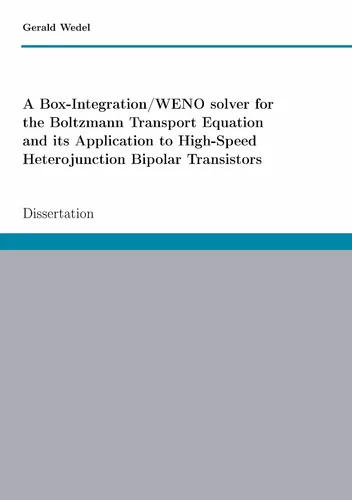Skip to the end of the images gallery Navigation umschalten
Skip to the beginning of the images gallery Navigation umschalten

A Box-Integration/WENO solver for the Boltzmann Transport Equation its Application to High-Speed Heterojunction Bipolar Transistors
Dissertation
Paperback
272 Seiten
ISBN-13: 9783744873727
Verlag: Books on Demand
Erscheinungsdatum: 08.08.2017
Sprache: Englisch
Farbe: Nein
19,99 €
inkl. MwSt. / portofrei
Ihr eigenes Buch!
Werden Sie Autor*in mit BoD und erfüllen Sie sich den Traum vom eigenen Buch und E-Book.
Mehr erfahrenThe ongoing trend for high-frequency (HF) applications
drives the development of high-speed devices.
Therefore, trustworthy device simulations are inevitable for understanding and designing future HF devices.
During the last decade, the predictive capabilities of Drift-Diffusion (DD) and Hydrodynamic (HD) transport models turned out to be insufficient for state-of-the-art high-frequency transistors. Consequently, a more physics based transport model helps to counter these issues and thus, the Boltzmann transport equation (BTE) comes into focus. In this thesis, a deterministic solution method for the BTE is pursued.
First, physical fundamentals and mathematical preconsiderations for the treatment of the BTE are reviewed. This covers the calculation of band structures/dispersion relations, an overview of scattering mechanisms and a detailed description of the coordinate transformations required for analyzing prominent semiconducting materials, such as Silicon-Germanium
and III-V compounds, like Indium-Phosphide.
The second part focuses on the numerical treatment of the BTE. Besides the employed normalization strategy, the discretization of the BULK BTE is described in detail. Based on the latter, the extensions for the device BTE are specified.
A method for the direct calculation of stationary BTE solutions
- for the BULK and device case - is introduced and an overview of the WENO method is outlined.
The third part is dedicated to the applications of the deterministic solution method and simulation results of the BTE. Recipes for calculating the most important quantities, like current/electron densities, are given. Simulation results for the BULK case and for hetero-junction bipolar transistors are presented and analyzed. Here, the focus is put on both Silicon/Silicon-Germanium and Indium-Phosphide/Indium-Gallium-Arsenide material systems. The part is concluded by a critical review on the current field of application.
A summary and an outlook on future extensions concludes the thesis. Besides pointing out the achievements of this work, the last section also gives a short motivation for adapting the method to 1D semiconductors, like carbon nanotubes.
drives the development of high-speed devices.
Therefore, trustworthy device simulations are inevitable for understanding and designing future HF devices.
During the last decade, the predictive capabilities of Drift-Diffusion (DD) and Hydrodynamic (HD) transport models turned out to be insufficient for state-of-the-art high-frequency transistors. Consequently, a more physics based transport model helps to counter these issues and thus, the Boltzmann transport equation (BTE) comes into focus. In this thesis, a deterministic solution method for the BTE is pursued.
First, physical fundamentals and mathematical preconsiderations for the treatment of the BTE are reviewed. This covers the calculation of band structures/dispersion relations, an overview of scattering mechanisms and a detailed description of the coordinate transformations required for analyzing prominent semiconducting materials, such as Silicon-Germanium
and III-V compounds, like Indium-Phosphide.
The second part focuses on the numerical treatment of the BTE. Besides the employed normalization strategy, the discretization of the BULK BTE is described in detail. Based on the latter, the extensions for the device BTE are specified.
A method for the direct calculation of stationary BTE solutions
- for the BULK and device case - is introduced and an overview of the WENO method is outlined.
The third part is dedicated to the applications of the deterministic solution method and simulation results of the BTE. Recipes for calculating the most important quantities, like current/electron densities, are given. Simulation results for the BULK case and for hetero-junction bipolar transistors are presented and analyzed. Here, the focus is put on both Silicon/Silicon-Germanium and Indium-Phosphide/Indium-Gallium-Arsenide material systems. The part is concluded by a critical review on the current field of application.
A summary and an outlook on future extensions concludes the thesis. Besides pointing out the achievements of this work, the last section also gives a short motivation for adapting the method to 1D semiconductors, like carbon nanotubes.
Eigene Bewertung schreiben










Es sind momentan noch keine Pressestimmen vorhanden.